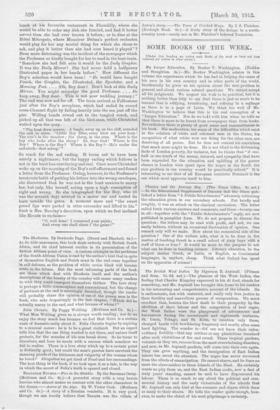The British West Indies. By Algernon E. Aspinall. (Pitman and
Sons. 75. 6d. net.)—The glamour of the West Indies, the feeling that Charles Kingsley expressed in his At Last, stands for something, and Mr. Aspinall has brought this home to his readers in his interesting and comprehensive account of the islands. Ho is enthusiastic, but with restraint, and really only does justice to their fertility and marvellous powers of recuperation. We must recollect that, besides the blow dealt to their prosperity by the abolition of slave labour and the competition of beet sugar, the West Indies were the playground of adventurers and buccaneers during the seventeenth and eighteenth centuries. St. Lucia, Tobago, and St Kitts, to mention only three, changed hands with bewildering frequency and mostly after some hard fighting. The wonder is—did one not know their extra- ordinary fertility—that any settlers or any plantations remained after such visitations of fire and sword. These tropical gardens, volcanic as they are, recover from the most overwhelming disasters, and now, as Mr. Aspinall predicts, will come into their own again. They can grow anything, and the immigration of East Indian labour has saved the situation. The negro has never recovered from the effects of emancipation. He cannot starve, and he fears no more the slave-raiders in these Islands of the Blest. He certainly wants no pity from us, and the East Indian coolie, now a fact of sixty years' standing, cannot be said to have dispossessed his labour. There is so much to say about the political and com- mercial history and the early vicissitudes of the islands that Mr. Aspinall can only hint at the romance and charm which draw so many to their shores. He tells the reader quite enough, how- ever, to make the object of his next pilgrimage a certainty.






































 Previous page
Previous page